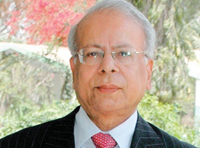The Role of Non-Banking Financial Institutions

Address by the Chief Guest Prof. Dr. Ishrat Husain (Chairman IBA CEIF & Advisor to PM on Institutional Reforms & Austerity) during the launch of 'Country Report on NBFI & Modaraba Sector' 2020. The launch was held on January 25, 2021 at IBA Karachi. The report was initiated in September 2019 jointly written by IBA CEIF and NBFI & Modaraba Association of Pakistan.
1. It is a pleasure to launch the NBFI- Modarabas Report prepared in collaboration with IBA-CEIF. I must congratulate the authors for producing a high quality report. I hope that this exercise would be undertaken regularly to create awareness about NBFIs among public at large.
2. Pakistan's savings and investment ratios are quite low compared to its neighbours. Bangladesh which like us had savings rate in the teens has now reached close to 30 percent of Gdp. This has reduced Bangladesh's dependence on foreign savings and foreign aid and enabled the country to attain investment ratios around 30 percent. The country is therefore growing at an average rate of 6 to 7 percent per annum. Poverty rates have come down to 22 percent – almost one half of what it was down in the early 2000s. This example I present to you as an illustration of the power of domestic savings. Pakistan's financial depth, financial inclusion and private sector credit to GDP ratios lag behind our neighbouring countries and other Emerging countries. There is thus a huge scope for expansion of the financial services sector in Pakistan, for raising our domestic resources and lending to private sector business for fixed investment. Currency in circulation ratio in Pakistan has risen to unacceptable level-almost one third of Broad Money and had reached over 6 trillion rupees at end June 2020. Islamic financing has become quite popular in Pakistan – 74% of those polled would like to switch to Islamic financing. A lot of small savers are not very much comfortable with banking services. There is a niche market i.e. the intersection of great interest in Islamic financing and small savers which in my view Modarabas and NBFIs can actually exploit to tap this pool of savings for productive purpose.
3. We are fortunate that we have at present very progressive minded and forward looking regulators – SECP and SBP. This is the time for your Association to move away from the traditional ways of doing business and bring about innovations as the regulators would assist and facilitate you. The risk is that fintechs may create such disruption that both banking and non-banking institutions lose their primacy. NBFIs should make use of technology to mobilize savings and reduce the cost of lending. Brick-and-mortar presence that entails a lot of up front expense can be avoided this way.
4. The waterfront covering the NBFIs has expanded vastly and new institutions such as Shariah Compliant mutual funds, Pension Funds, Provident Funds, Endowment Funds, REITS, investment finance companies have been set up in last two decades. These institutions can play a very critical role in the development of Capital debt markets that are yet to take off. SECP has recently encouraged setting up of Housing finance companies to participate in the Rs. 500 billion investments to be channeled towards construction. These investments in low cost housing have both financial as well social returns .Islamic finance has an attractive product to offer i.e. the Diminishing Musharika which gradually builds up the equity of the borrower and improves his creditworthiness.
5. Shariah compliant institutions – both banking and non-banking have the opportunity to use their liquidity for the Sukuks which are now a regular feature of the Borrowing Strategy of the Government of Pakistan. The maturity mismatch inherent in the banking business can be overcome by those long term investment instruments. NBFIs, Insurance Companies, REITS, Housing finance Companies, Infrastructure Investment Funds are looking for opportunities to deploy their resources which they can invest in long term housing and infrastructure projects. I am also sad to see that bank lending to SMEs has declined from 17% to 7%-a big setback and reversal of broadening the access to finance. Similarly, the Advance-Deposit ratios which ranged between 70 to 80% are now on average below 50%. Thus there is great scope of improving financial inclusion for both banks and NBFIs.
6. I was glad to note that the Pakistan Power Sukuk-II attracted a lot of interest by NBFIs and the healthy competition resulted in a significant saving for the issuer i.e. the GoP compared to the traditional ways of issuance. I would encourage the Modarabas and NBFIs to continue their participation in these issues by the Corporates as well as sovereign. Let me conclude by thanking the organizers for inviting me to share my thoughts with you.